Fresh water replenishes China's longest inland river


But he knew too well the taste of sandstorms.
"When the 'black storms' struck, I could see nothing, and the sheep couldn't find their way home," he recalled of the sandstorms in the old days.
"Nothing could be seen when a black storm hit, and nothing was left after the storm," says Wang Jianben, 74, who lives on a farm some 100 km away from Ahmat's village.
"Most of the crops would be blown away, and the farmers had to replant the crops three to four times in a single spring."
Before his retirement, Wang irrigated farmland for decades and witnessed local farmers' continuous battles against sandstorms.
"It didn't just feel like a black storm, it was as if the whole desert was approaching," recalls Liu Conghui, a writer who was born, and still lives, near the farm Wang once worked.
As the menacing sandstorms made the area increasingly inhospitable, Liu's whole community planned to up sticks.
To restore the local ecosystem, the Chinese government launched a 10.7 billion yuan ($1.6 billion) project in 2001. A set of measures were adopted such as saving water, converting farmland into grassland, providing treatment for dry riverways and building dams. In addition to those measures, industrial and agricultural use of water in cities and counties along the river was limited.
Over the past two decades, Xinjiang has infused 7.7 billion cubic meters of water into the dry trunk stream of the lower reaches of the Tarim River in 19 rounds of water diversion.
Statistics show that a total of 2,285 square km of vegetation along the lower reaches of the river have been restored or improved thanks to the irrigation project. Meanwhile, the area of sand has been reduced by 854 square km.
In the end, the resettlement plan for Liu's community was never implemented, so he still lives where he was born. He can now grow fruit and vegetables in his yard, and often invites friends over for barbecues.
Although there are still occasional spells of dusty weather in early spring, "black storms" are certainly a thing of the past.
"I hope it is just a memory of our generation and will never be passed on," says Wang.
With the ponds and lakes refilled with water and pastures covered in lush grass, Ahmat can now enjoy grazing his 300 sheep in the spring breeze.
Ahmat recently fell in love with boiled fish, but is yet to master making the Lop Nur people's signature meal - grilled fish.
"I've seen a lot of grass carp and common carp in the water. I must learn to make a living from them, as my ancestors once did," he says.
Xinhua
- Man sentenced to death for killing ex-girlfriend in Anhui
- A US youth reflects on the 'cave-dwelling conversation'
- China unveils first AI model to gauge weather's impact on stock market
- Tianjin launches youth program to cultivate university talent for tech market
- Local farmers combat desertification in Moyu county of Xinjiang
- N China's Hohhot launches winter amusement programs to boost local economy





































